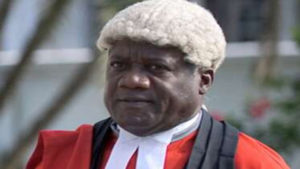 BRIDGETOWN, Barbados, CMC – A Barbados High Court judge is calling for a revamped education system that includes options for troublesome students other than suspension and expulsion as a means of addressing the crime situation in the country.
BRIDGETOWN, Barbados, CMC – A Barbados High Court judge is calling for a revamped education system that includes options for troublesome students other than suspension and expulsion as a means of addressing the crime situation in the country.
Justice Carlisle Greaves is also calling for new thinkers and ideas to tackle the scourge even as he expressed concern that authorities “give up on our people too easily”, rather than offer them avenues to redeem themselves.
“We really should not have so many people committing crime, . . . and instead of putting so many people in jail, we should be putting them through school, university, polytechnic, that kind of thing, so that we will build up ourselves, build up our nation. We cannot do criminal justice on the cheap,” Justice Greaves told a sitting of the Supreme Court on Tuesday.
“No state should have to spend all of this money on judges to hear cases, on prosecutors to prosecute them, investigators to investigate them, and prisons to hold them. We should be spending this money on healthcare, education and building . . . roads, but some people drive us into this. I do not understand why as a people we seem to so easily choose the dark path, the path of calamity, rather than progress,” Justice Greaves added.
The judge, referring to some of the pre-sentencing reports that are presented to the court on offenders, suggested that the issue be tackled at the school level, through education reform, and by investing in the sector in “the correct way.”
“I believe we should be investing a lot of resources in remedial programmes. When you look through these files, you see a lot of these gentlemen coming in here . . . dropped out of school . . . no certification,” he said.
“A man cannot be so dumb that he can’t get [any] certificates at all. Maybe the certificates . . . require them to get it at the wrong time . . . so we need to reform our whole . . . education [system],” Justice Greaves said, pointing to the need to end the practice of suspending students for bad behaviour and then leaving them to their own devices.
“We have . . . in Barbados where children get suspended for bad behaviour for two weeks and he is home knocking around doing foolishness. He should be sent to a place where there are specialist teachers and counsellors to deal with the issues that need to be dealt with and then return to his classroom so that he maintains some pride,” Justice Greaves continued, adding, “You have to be able to see where people are not performing or are not going to perform and so on and [fix it]. We have to be slow in kicking people out of school . . . early because they are giving trouble when we should be putting them in a remedial place for a fixed time, then they could go back to school.”
He also told the Court that “everybody was not made to sit in a classroom and memorise and regurgitate” and called for “new ideas and ways” to steer the youth from a life of crime.
The judge said that judicial officers and law enforcement officers have greater insight into some of the issues plaguing the youth and should, therefore, be encouraged to go into schools and speak to children candidly about the dangers of getting involved with guns, drugs, and other crime.
“There is no subject in our classrooms, as far as I know, that really teaches our children about social responsibility. We should have a subject like that. We should be teaching law in our classes from 13, so [one] understands that it is an offence to possess drugs and guns . . .
“I am not talking about coming into the place and threatening [them] . . . . I am talking about the ability to communicate . . . and show the children that things that they take lightly [should] be taken more seriously. Show them how easy it is to get into trouble . . . we need programmes like that. We got a lot of work to do to turn around our people,” Justice Greaves added.
